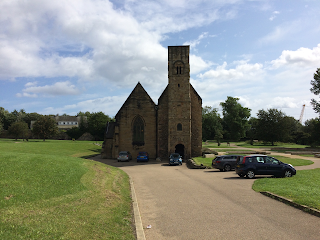Across from the Roker Hotel
there is a walkway above the beach.
Going north there is an open grassy area and on the street side is a
memorial to Baeda with a tall cross carved with images and Latin text set on a
base with the inscription:
To the glory of God
and in memory of his servant Baeda the Venerable
Who was
born between Wear and Tyne DCLXXXIII
And died
at Jarrow DCCXXXV
It was to me a bit of a
mystery that someone born over a thousand years ago would have his writings carved
in stone and set in a prominent place. I
knew nothing of Bede, but I set about first from Wikipedia and then ordering
his most famous book ‘The Ecclesiastical History of the English People’ from
Amazon, which I am reading now.
Bede wrote the history of
the English people from a vantage point of life at the tail end of the Anglo
Saxon invasion when much of what was known was fresh in the minds of living
people. He wrote in Latin and he wrote before the Viking
attacks and before even than Beowulf who I have usually thought of as emerging
from the darkness of English pre-history.
Bede writes
clearly of these times and of the conversion of England to Christianity. Some of the stories of Christianity are
uncannily like the stories of Paul’s journeys in the New Testament with prayer,
and fasting, of conversions and miracles.
The book begins with the arrival of people to England. I realized that for Bede people had spread throughout
the world from Eden and would have of course had to cross in ships to settle
England. He could not have been aware that
the North Sea had been dry land for several thousand years after the ice age
and people who arrived did so by walking.
He follows with the Britons, the Picts and the Irish living on the
island when the Romans arrive, he tells the history of Roman legions in Britain
and then after their departure the arrival of the Anglo Saxons. The heart of the book is the story of the introduction and spread of Christianity throughout the island.



